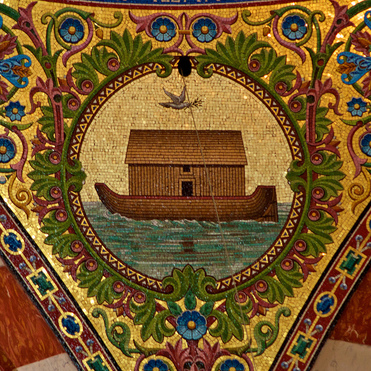Between Stockholm Syndrome and Lima Syndrome
Part 56: Religions' Resistance to Change

Our wretched species is so made that those who walk on the well-trodden path always throw stones at those who are showing a new road.
-VOLTAIRE (1694-1778)
It’s so hard for humans to accept change. As expressed by French critic and journalist Jean-Baptiste Karr (1808-1890): the more things change, the more they stay the same (plus ça change, plus c'est la même chose).
In essence, even seemingly radical changes do not structurally affect reality other than to cement the status quo. For sure, change interferes with authority—divine or otherwise. Even worse, it challenges authority for it affects control of the establishment over their subjects and weaken the status quo. "If you want to make enemies," Woodrow Wilson (1856-1924) once said, "try to change something." Never mind that those who resist change at all costs are usually the beneficiaries of change themselves.
In religion—which derives from the word religare (Latin) and means 'to bind'—the resistance to change happens all the time. As stated in Part 34 (An Unexamined Belief is not Worth Believing), Buddha, Jesus, and Muhammad (to name just a few agents of change), were converts themselves and were at once condemned as 'infidels' by the status quo of their times.
Literally and figuratively, stones after stones had been thrown at these religious leaders. The Buddha rebelled against Hinduism and ran away from his father, who was so disappointed by his son's departure and search for enlightenment, that he sent 10,000 messengers to persuade his son's return. Jesus' parents, uncle and aunt were Torah-observant Jews, yet he rebelled against Judaism for which he was eventually crucified. Muhammad rebelled against the tyranny of Meccan tribes who worshiped pagan idols, and was forced to escape from Mecca to Medina in 622 to avoid persecution.
That said, change is clearly inevitable, for the universe, as well as our place in it constantly changes. Contrary to the Church's Middle Ages geocentric tenet in which the Earth is regarded as the center of all celestial bodies, the universe is anything but. To paraphrase Guy Murchie in The Seven Mysteries of Life (1999), planet Earth is orbiting the sun at 18.5 miles per second, while the sun and virtually all visible stars are swinging at 150 miles per second around the Milky Way galaxy, which with a diameter of 100,000 light years, is speeding from other galaxies at thousands of miles per second in an inflating universe..
Yet if we look around there are billions of believers who faithfully cling to every single literal word of their Torahs, Bibles or Korans. An article in The Huffington Post of April 26, 2016 ("Life-Sized Noah’s Ark Replica To Hit The High Seas This Summer") by Nina Golgowski reported that Johan Huibers, a Dutch carpenter, completed the biblical boat in 2012. He planned to move the massive vessel from its port in the Netherlands to Brazil as part of a multi-country 6,000-mile journey to South, Central and North America "to spread the message of the Bible."
Very soon a full-size Noah’s Ark will be featured in the Ark Encounter in Williamstown, Kentucky. According to its website, the ark was "built according to the dimensions given in the Bible. Spanning 510 feet long, 85 feet wide, and 51 feet high, this modern engineering marvel will amaze visitors young and old." Prospective visitors are promised to "experience the pages of the Bible like never before."
Meanwhile, a Quran (9:5) verse states to "(s)lay the idolaters wherever ye find them."
Seriously? In the Voltarian context, when Muhammad was chased away from Mecca to Medina in 622 to avoid persecution by the pagan tribes—those who walk on the well-trodden path—, was he himself not considered as one who showed a new road? It seems that self introspection is a rare commodity.
Thus, can humans for once transcend literal interpretations on whatever is expressed in the Torah, Bible or Quran and search for higher spiritual meanings of what is implied? Can we adapt our worn-out dogmas, creeds, and scriptures to real-world realities? The ability to adapt is critical to our survival. "It is not the strongest of the species that survives, nor the most intelligent," Charles Darwin wrote, "it is the one most adaptable to change."
[To be continued.]
Johannes Tan, Indonesian Translator & Conference Interpreter
-VOLTAIRE (1694-1778)
It’s so hard for humans to accept change. As expressed by French critic and journalist Jean-Baptiste Karr (1808-1890): the more things change, the more they stay the same (plus ça change, plus c'est la même chose).
In essence, even seemingly radical changes do not structurally affect reality other than to cement the status quo. For sure, change interferes with authority—divine or otherwise. Even worse, it challenges authority for it affects control of the establishment over their subjects and weaken the status quo. "If you want to make enemies," Woodrow Wilson (1856-1924) once said, "try to change something." Never mind that those who resist change at all costs are usually the beneficiaries of change themselves.
In religion—which derives from the word religare (Latin) and means 'to bind'—the resistance to change happens all the time. As stated in Part 34 (An Unexamined Belief is not Worth Believing), Buddha, Jesus, and Muhammad (to name just a few agents of change), were converts themselves and were at once condemned as 'infidels' by the status quo of their times.
Literally and figuratively, stones after stones had been thrown at these religious leaders. The Buddha rebelled against Hinduism and ran away from his father, who was so disappointed by his son's departure and search for enlightenment, that he sent 10,000 messengers to persuade his son's return. Jesus' parents, uncle and aunt were Torah-observant Jews, yet he rebelled against Judaism for which he was eventually crucified. Muhammad rebelled against the tyranny of Meccan tribes who worshiped pagan idols, and was forced to escape from Mecca to Medina in 622 to avoid persecution.
That said, change is clearly inevitable, for the universe, as well as our place in it constantly changes. Contrary to the Church's Middle Ages geocentric tenet in which the Earth is regarded as the center of all celestial bodies, the universe is anything but. To paraphrase Guy Murchie in The Seven Mysteries of Life (1999), planet Earth is orbiting the sun at 18.5 miles per second, while the sun and virtually all visible stars are swinging at 150 miles per second around the Milky Way galaxy, which with a diameter of 100,000 light years, is speeding from other galaxies at thousands of miles per second in an inflating universe..
Yet if we look around there are billions of believers who faithfully cling to every single literal word of their Torahs, Bibles or Korans. An article in The Huffington Post of April 26, 2016 ("Life-Sized Noah’s Ark Replica To Hit The High Seas This Summer") by Nina Golgowski reported that Johan Huibers, a Dutch carpenter, completed the biblical boat in 2012. He planned to move the massive vessel from its port in the Netherlands to Brazil as part of a multi-country 6,000-mile journey to South, Central and North America "to spread the message of the Bible."
Very soon a full-size Noah’s Ark will be featured in the Ark Encounter in Williamstown, Kentucky. According to its website, the ark was "built according to the dimensions given in the Bible. Spanning 510 feet long, 85 feet wide, and 51 feet high, this modern engineering marvel will amaze visitors young and old." Prospective visitors are promised to "experience the pages of the Bible like never before."
Meanwhile, a Quran (9:5) verse states to "(s)lay the idolaters wherever ye find them."
Seriously? In the Voltarian context, when Muhammad was chased away from Mecca to Medina in 622 to avoid persecution by the pagan tribes—those who walk on the well-trodden path—, was he himself not considered as one who showed a new road? It seems that self introspection is a rare commodity.
Thus, can humans for once transcend literal interpretations on whatever is expressed in the Torah, Bible or Quran and search for higher spiritual meanings of what is implied? Can we adapt our worn-out dogmas, creeds, and scriptures to real-world realities? The ability to adapt is critical to our survival. "It is not the strongest of the species that survives, nor the most intelligent," Charles Darwin wrote, "it is the one most adaptable to change."
[To be continued.]
Johannes Tan, Indonesian Translator & Conference Interpreter

 RSS Feed
RSS Feed